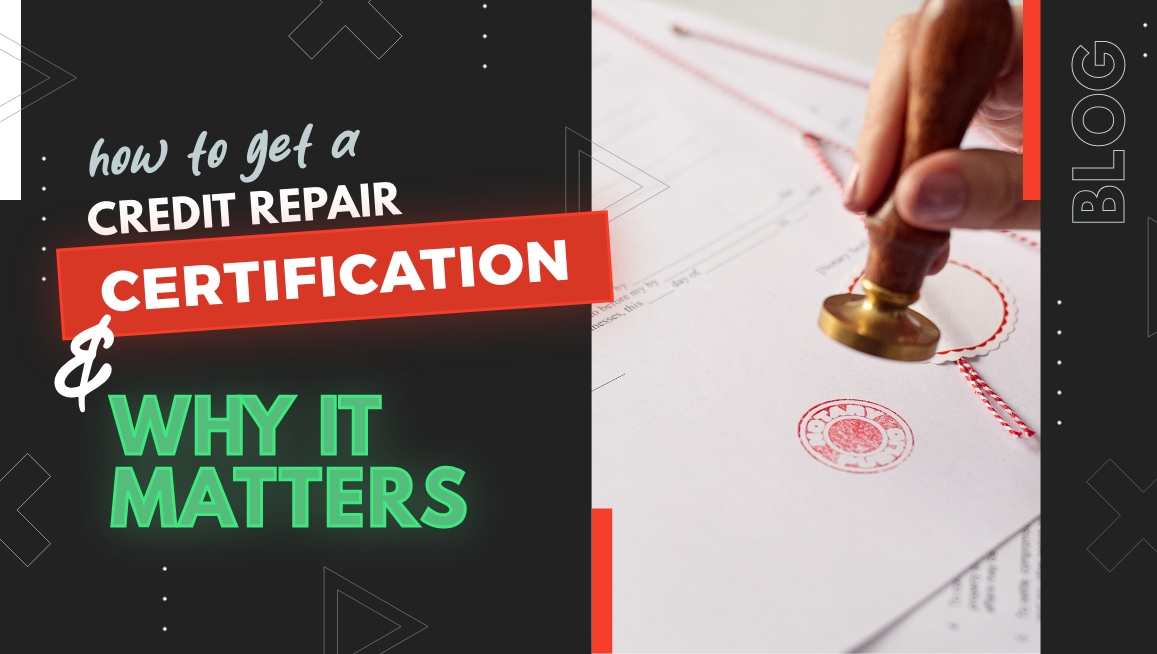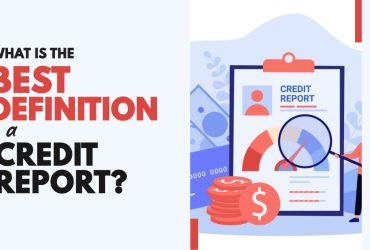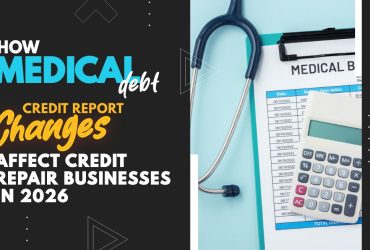How to Get a Credit Repair Certification and Why It Matters
by Almas Tariq
May 28, 2025
07:59 PM

The credit repair industry has experienced rapid growth over the last decade. More consumers than ever are seeking help to fix errors on their credit reports and improve their credit scores. As demand increases, so does the need for professionalism, knowledge, and ethical business practices.
For credit repair business owners, standing out from the competition requires more than just tools or templates. Clients want to work with professionals who understand credit laws, use compliant processes, and build trust. This is where credit repair certification becomes essential. It’s not just a badge or a marketing tool—it’s proof of your commitment to excellence.
Credit repair certification equips you with up-to-date legal knowledge, practical skills, and business insights. It ensures that your business follows the law while helping clients in an ethical and effective manner. Certification also reassures your clients that they’re working with someone qualified and trustworthy.
In this blog, you will learn what credit repair certification is, why it matters, and how it can benefit your business. We’ll explore the legal framework surrounding credit repair, walk through the certification process, and explain how to choose the right program. You’ll also discover how credit repair education helps you grow and protect your business.
Whether you’re just starting out or looking to expand your services, understanding the value of certification is a key step forward. Let’s dive in and see why getting certified is more than just a smart move—it’s the foundation of a successful and compliant credit repair business.
Introduction to Credit Repair
Credit repair is a vital process for anyone looking to take control of their financial future. Whether you’re an individual hoping to qualify for a loan or a business owner aiming to help clients achieve financial stability, understanding credit repair is the first step toward lasting financial well-being. At its core, credit repair involves reviewing credit reports, identifying negative information, and working to correct errors or inaccuracies that may be affecting credit scores.
A reputable credit repair company guides clients through the often complex credit repair process. This typically includes analyzing credit reports, drafting and submitting dispute letters to credit bureaus, and following up with validation letters to ensure that only accurate, verifiable information remains on the report. By addressing these issues, clients can see significant improvements in their credit scores, opening doors to better financial opportunities.
For those interested in starting a credit repair business, becoming a certified credit counselor is essential. This requires completing a comprehensive credit repair course, which covers everything from credit counseling fundamentals to the legal aspects of working with credit bureaus. Effective credit repair training not only teaches you how to write dispute letters and manage the dispute process, but also equips you with the skills to educate clients, manage cash flow, and build a sustainable business model.
Certification in credit repair demonstrates your expertise and commitment to ethical practices. By enrolling in a reputable credit repair course and passing the final exam, you gain the knowledge and credentials needed to stand out in the industry. This training empowers you to help clients achieve their financial goals, manage debts, and improve their overall financial health.
In summary, credit repair is more than just fixing credit—it’s about empowering clients to achieve financial success. With the right training, certification, and business practices, you can make a meaningful difference in your clients’ lives while building a thriving credit repair business.
What Is Credit Repair Certification?
Credit repair certification is a professional credential that proves you have completed formal training in credit repair services. It shows that you understand credit laws, dispute processes, and ethical standards. While the government does not require it, certification is still a highly recommended step for credit repair professionals.
Many people confuse a general business license with credit repair certification. However, these two documents serve very different purposes. A business license allows you to operate legally in your state or city. In contrast, a credit repair certification demonstrates that you have been trained specifically in the credit repair field.
A certified credit repair specialist has completed a structured program that covers vital topics. These topics often include credit scoring models, the Credit Repair Organizations Act (CROA), the Fair Credit Reporting Act (FCRA), and ethical dispute handling. These programs are created by recognized associations or industry experts and are designed for credit repair businesses—not consumers. Many credit repair courses are available online and are designed for students seeking to become certified credit counselors.
Although certification is not mandatory, it has become a standard of professionalism in the industry. In today’s competitive environment, clients are more cautious about who they trust. They want to work with businesses that follow the law and understand the credit system. A credit repair certification can give your business that credibility.
Several reputable organizations offer credit repair certification programs. These include:
- NACSO (National Association of Credit Services Organizations)
- Credit Consultants Association (CCA)
- National Credit Reporting Association (NCRA)
Each of these organizations has its own curriculum, format, and focus areas. Some offer self-paced online courses, while others include live training and exams. Most of these certifications require you to learn and apply real-world practices, not just theory. Upon completion, students may become certified credit counselors, which is a recognized professional credential in the industry.
As you continue reading, you will see how certification ties directly into legal compliance, client trust, and long-term business growth. Understanding what a credit repair certification is—and what it is not—is the first step toward elevating your credit repair business. Let’s now explore why this credential truly matters.
Why Credit Repair Certification Matters for Your Business
Once you understand what a credit repair certification is, the next question becomes: why does it matter? In short, certification is more than just a piece of paper. It is a strategic advantage that sets your credit repair business apart in a competitive industry.
One of the most important reasons to get certified is to build trust. Clients who seek credit repair services are often vulnerable and stressed. They want to work with someone they believe is qualified and ethical. When you display your credit repair certification, you immediately increase your credibility. It reassures clients that you understand their situation and have the training to help them.
Moreover, certification demonstrates your professionalism. It shows that you have invested time and effort into learning the rules that govern credit repair. These include laws like the Credit Repair Organizations Act (CROA), the Fair Credit Reporting Act (FCRA), and others. Being familiar with these regulations helps you operate in a legally compliant way, reducing the risk of violations.
Another benefit is that certification clearly differentiates your business from uncertified competitors. Anyone can launch a website and claim to offer credit repair. However, not everyone takes the steps to prove they know what they’re doing. Your credit repair certification serves as proof that you are serious about this work—and that you follow the rules. Certification also distinguishes you from an employee at a credit repair company by demonstrating your expertise as a business owner, not just someone who pulls credit reports or drafts dispute letters.
Additionally, being certified can help during audits or investigations. If your business is ever reviewed by a regulator, your training records and certifications can show that you’ve made compliance a priority. This proactive approach could be the difference between passing an audit or facing penalties.
From a business development perspective, certification also enhances your marketing. It gives you a powerful message for your website, social media, and consultations. You can confidently explain your qualifications, your training, and your legal knowledge. This makes your business more appealing to both clients and potential partners. Certification can also open up new career paths, such as becoming a credit counselor, housing counselor, student loan counselor, life coach, or starting your own consulting business.
Let’s highlight a few of the direct business benefits of credit repair certification:
- Improved client conversion because of increased trust
- Higher retention rates due to more effective, ethical service
- Easier partnerships with affiliates, lenders, and financial advisors
- Ability to attract more customers due to increased trust and professionalism
As you can see, certification doesn’t just help with learning—it transforms how others see your business. It creates a strong foundation for growth, reduces legal risk, and boosts your reputation. Certification can also help increase your income by enabling you to offer higher-value services and expand your business. In the next section, we’ll explore the specific credit repair laws you will become familiar with during certification.
Understanding Credit Repair Laws You’ll Learn About
When you pursue a credit repair certification, one of the most valuable benefits is legal education. The credit repair industry is governed by strict consumer protection laws. Knowing these laws is essential to avoid penalties and maintain ethical practices. Most certification programs teach you the legal foundations required to operate a compliant business.
The most important law in credit repair is the Credit Repair Organizations Act (CROA). This federal law regulates how you market, charge for, and deliver credit repair services. CROA was designed to protect consumers from deceptive practices. It requires you to give written contracts, avoid upfront fees, and provide clear disclosures.
Under CROA, you must include a “right to cancel” statement in your agreements. Clients must receive this notice before they sign. You also cannot promise a specific credit score improvement or misrepresent your services. Violating CROA can result in lawsuits, fines, or even business closure. Therefore, credit repair certification programs place strong emphasis on understanding and following these rules. CROA also sets limitations on what can be disputed or corrected, so it’s important to understand these boundaries when assisting clients.
Another key law you will study is the Fair Credit Reporting Act (FCRA). This law governs the collection, use, and accuracy of credit report data. The accuracy of information on a credit report can directly affect a consumer’s credit score, making it crucial to ensure all data is correct. As a credit repair professional, you will regularly interact with credit reports. You need to know what consumers are entitled to and how to challenge inaccurate information. FCRA explains the dispute process, response timelines, and your client’s rights. There are also limitations under FCRA regarding what information can be disputed or removed, so understanding these restrictions is essential for effective credit repair.
In addition, the Fair Debt Collection Practices Act (FDCPA) plays an important role. While it targets debt collectors, it also affects how you advise clients about their rights. Understanding this act helps you guide clients through difficult debt situations without giving false or risky advice. It is important to determine exactly what a client owes, as this can affect the dispute process and ensure that only valid debts are addressed. The FDCPA also imposes limitations on the types of debts and collection practices that can be challenged or corrected.
The Gramm-Leach-Bliley Act (GLBA) is another law you will likely learn about in certification programs. It focuses on data privacy and secure handling of personal financial information. As a credit repair business, you deal with sensitive documents every day. GLBA requires you to create and follow a privacy policy and take steps to protect client data.
Operating without knowledge of these laws is risky. You may unknowingly violate rules that could lead to legal action or damage your reputation. Many new credit repair businesses get into trouble simply because they didn’t know the rules. Certification ensures that you understand the legal landscape before helping clients.
Here are just a few things you will learn to do properly through credit repair certification:
- Disclose client rights in writing
- Respect mandatory waiting periods before billing
- Submit disputes that are accurate and legally compliant
- Safeguard sensitive client data
Learning these laws is not just about avoiding trouble. It’s about running a business that lasts and helps people the right way. In the next section, we’ll help you choose the right certification program based on quality, credibility, and coverage of these legal essentials.
How to Choose the Right Credit Repair Certification Program
Now that you understand the laws and the value of certification, the next step is choosing the right program. Not all credit repair certification courses are created equal. Picking the wrong one could waste your time, money, and put your business at risk. That’s why it’s important to know what makes a program reliable, comprehensive, and worth your investment.
First, look at the accreditation and reputation of the certification provider. Choose a program backed by industry-recognized organizations or those with long-standing credibility. A reputable program will have clear reviews, transparent content, and proven results from past participants. You want to avoid unknown providers that offer vague promises and no accountability.
Second, make sure the program covers legal compliance training in detail. A good credit repair certification must teach you how to follow federal laws like CROA, FCRA, FDCPA, and GLBA. Legal knowledge should not be optional—it should be central to the curriculum. If a course doesn’t focus on compliance, it could lead you down the wrong path.
Third, look for credit repair courses that offer real-world practice knowledge. Legal theory is important, but you also need to know how to apply it. Programs that include role-playing, templates, case studies, and examples of real disputes are much more effective. These resources help you turn knowledge into action. Some comprehensive credit repair courses also provide coaching and business software as part of their package, giving you personalized guidance and essential tools to help you succeed.
Fourth, the program should provide training in actual business operations. This includes client onboarding, building a compliant service workflow, handling disputes, and managing record-keeping. You’re not just learning how to repair credit—you’re learning how to run a credit repair business. A strong certification program should prepare you for both.
Let’s compare a few of the more well-known certification options:
- Credit Consultants Association (CCA): Offers the Certified Credit Consultant (CCC) program, which includes legal training and business support materials.
- National Association of Credit Services Organizations (NACSO): Focuses on compliance and industry best practices. Offers industry recognition through membership.
- National Credit Reporting Association (NCRA): Offers broader training, including credit reporting, mortgage credit, and data privacy standards.
While each program has its strengths, the right choice depends on your business goals and learning style. However, always check for red flags before signing up:
- Programs that don’t mention legal compliance or CROA
- “Fast-track” certifications that promise training in under an hour
- Courses that rely heavily on upsells and paid add-ons for basics
- No transparency on what the program actually teaches
When you’re ready to take the next step, enroll in a reputable credit repair course that fits your needs and offers the support you require.
Choose wisely, because your credit repair certification will shape your business foundation. A quality program gives you tools to serve clients legally, ethically, and effectively. To get more information or start the enrollment process, look for a registration form or contact form on the provider’s website. In the next section, we’ll walk through the actual steps of getting certified so you can begin your journey with clarity.
Step-by-Step Process to Get Your Credit Repair Certification
Once you’ve selected a reputable program, it’s time to begin your certification journey. Earning your credit repair certification is not difficult, but it does require commitment and focus. Many students benefit from coaching and support throughout their credit repair courses, which can provide personalized guidance and mentorship. A structured approach will help you complete the process efficiently and with full understanding of your responsibilities as a credit repair professional.
Below is a simple step-by-step breakdown of how to get certified, from choosing a provider to ongoing education.
Step 1: Research and Choose a Provider
Start by comparing different certification programs and credit repair courses. Make sure the provider teaches legal compliance, dispute techniques, and business operations. You should verify their reputation and confirm whether they have been endorsed by recognized industry associations. Review testimonials, look for sample materials, and examine the program syllabus before enrolling.
Look for:
- Curriculum that includes CROA, FCRA, FDCPA, and GLBA
- Training in real-world credit repair practices
- Business setup and client management modules
- Transparent pricing and no hidden upsells
This decision shapes your entire learning experience, so take time to evaluate your options. Once you have found the right credit repair course or certification program, enroll in the one that best fits your needs.
Step 2: Register and Pay Fees
Once you select the right program, go ahead and register. Most certification programs allow online enrollment, often requiring you to fill out an online registration form as part of the process. You will typically need to pay a one-time fee, which can vary depending on the depth of the training and included resources. Some programs offer payment plans or bundled packages with toolkits and contracts.
Before paying, review refund policies and confirm what materials are included in the fee.
Step 3: Complete the Coursework
After enrollment, you will get access to training modules or videos. These cover essential topics like legal obligations, dispute procedures, client communications, and workflow setup. Complete each section carefully and take notes. Students should aim for timely completion of each module to ensure steady progress through the program.
Most programs are self-paced, allowing you to study on your own schedule. However, staying consistent is key to completing the training in a reasonable time. Allocate a set number of hours per week to study, and track your progress.
Tips for completing your coursework:
- Set daily or weekly study goals
- Review laws like CROA and FCRA multiple times
- Join peer groups or forums to stay motivated
Step 4: Pass the Final Exam or Assessment
Once you finish the coursework, you must pass a final exam or complete a project. Successful completion of the exam is required to earn certification. This ensures that you understand the content and can apply what you’ve learned in real situations. Exams typically include multiple-choice questions or scenario-based problem-solving.
Prepare by reviewing each module and using any practice tests provided by the program. Don’t rush this part—it confirms you’re ready to work as a certified credit repair professional.
Step 5: Receive Certification and Explore Ongoing Education
After you pass the exam, you’ll receive your official credit repair certification. You can now display this credential on your website, in consultations, and across your marketing materials. Many certified credit counselors use their credential to advance their career in credit repair or related fields, such as credit counseling, housing counseling, or financial coaching. Most programs also offer continuing education or optional membership benefits.
Stay updated on industry changes, especially law updates. Certification is not a one-time achievement—it’s the start of ongoing learning in your business journey.
Bonus Tips for Success
- Stay organized with a calendar or task list during the process
- Reach out to instructors if you need help understanding a topic
- Join industry Facebook groups or LinkedIn communities for support
Getting certified is a milestone, but it’s also the start of doing business the right way. In the next section, you’ll learn how continuing education can further strengthen your operations and ensure your long-term success.
How Credit Repair Education Strengthens Your Business Long-Term
Earning your credit repair certification is only the beginning. To remain competitive and compliant, you must continue learning even after certification. Ongoing credit repair education strengthens your business from the inside out. It enhances your client experience, legal awareness, and overall service quality. Coaching is especially valuable for continuous professional development, providing personalized guidance and mentorship to help you and your team stay ahead.
Credit repair laws and dispute strategies often evolve. Regulatory bodies may introduce new compliance requirements. Dispute tactics may shift due to changes in credit bureau processes or legal interpretations. If you fail to stay informed, you risk using outdated practices that could harm your clients—or your business. That’s why continuing education is not optional. It’s essential.
Through consistent training, you’ll maintain a current understanding of laws like the Credit Repair Organizations Act (CROA), the Fair Credit Reporting Act (FCRA), and data security requirements under the Gramm-Leach-Bliley Act (GLBA). This ongoing knowledge helps you avoid compliance mistakes and deliver services with confidence.
Credit repair education also helps you develop a skilled, consistent team. When your staff receives the same foundational training, they perform at a higher standard. They speak the same language, follow uniform processes, and provide consistent support to your clients. This leads to fewer service gaps and stronger results. Certifying each employee ensures consistent service quality and professional standards across your business.
More importantly, a focus on education enables you to scale your credit repair business without compromising quality. When everyone follows a unified, compliant approach, your growth becomes sustainable. You no longer rely on one person’s expertise. Instead, your business operates on systems and standards created through professional training.
Additionally, credit repair certification programs often allow you to certify employees. This gives your team professional credibility while protecting your business. Trained employees are more confident, less likely to make mistakes, and more invested in their role.
Here are just a few long-term benefits of continuous education and certification:
- Build internal SOPs using certified knowledge
- Train and onboard new team members faster
- Make education a core part of your brand identity
Advanced training also enables you to help clients develop effective financial plans, supporting their broader credit management and financial health goals.
When credit repair education becomes part of your culture, your business stands out. Clients notice the difference. Partners respect your professionalism. Regulators see your commitment to compliance.
In the next section, you’ll discover how to integrate your certification into your branding and marketing to drive even more growth.
Integrating Certification Into Your Business and Marketing
After earning your credit repair certification, the next step is to make it work for your business. Certification is more than just a personal achievement—it’s a valuable marketing and branding asset. When integrated correctly, it boosts your credibility and strengthens client trust across every part of your operation, making it easier to attract new customers who are looking for reliable credit repair services.
Start by making your certification a core element of your brand identity. Highlight it across your marketing channels to show clients and partners that you follow industry best practices. Your certification proves that you understand credit repair laws, comply with regulations, and provide ethical, results-driven services.
Your website is the first place most people will check before contacting you. Make sure you display your credit repair certification clearly. Add it to your homepage, About page, and service pages. You can even include a dedicated section explaining what the certification means, what laws you’re trained in, and how it benefits the client.
Social media also offers great opportunities to promote your credential. Post your certificate, share the story behind your training, or explain how certification improved your services. These posts show transparency and professionalism, helping build trust with new followers and leads.
In addition, use your certification as a trust-building tool during sales calls and client consultations. When you explain that you are certified, it sends a message of expertise. You are not just offering a service—you’re offering knowledge backed by law, practice, and commitment. This can help convert more prospects into customers.
Certified professionals often qualify for opportunities that uncertified businesses cannot access. These include speaking engagements, guest blogging, and partnerships with financial advisors or affiliate networks. Many platforms prefer to feature experts who are formally trained and operate with integrity.
To further streamline your certified business operations, consider using specialized credit repair business software. The right software can help you manage client information, automate compliance tasks, and deliver better service, making your processes more efficient and professional.
To see how powerful certification can be, consider examples from real businesses. Many certified credit repair professionals report higher close rates, stronger client relationships, and more referral business. They become known as the go-to experts in their niche—all because they took the time to earn and showcase their certification.
A few simple ways to integrate certification into your brand:
- Add “Certified Credit Repair Specialist” to your email signature
- Include it in your pitch deck or service proposals
- Mention it in ads, webinars, and client onboarding sessions
When you communicate the value of your credit repair certification clearly and consistently, it becomes a magnet for trust and business growth. Let’s now bring everything together in a closing summary that shows why certification is not just helpful—but essential.
Conclusion
As the credit repair industry continues to grow, so does the demand for knowledgeable and ethical service providers. Clients today are more cautious and better informed. They want to work with businesses that not only promise results but also follow the law. That’s why earning a credit repair certification is no longer a luxury—it’s a necessity.
Throughout this blog, we’ve explored what certification means, why it matters, and how it strengthens your business. Certification proves that you understand credit laws like CROA, FCRA, FDCPA, and GLBA. It shows that you operate with integrity, follow compliant processes, and protect your clients’ rights.
More importantly, certified credit repair professionals consistently outperform those who are not certified. They build stronger relationships with clients, handle disputes more effectively, and face fewer legal risks. Their businesses grow faster because they earn trust, close more sales, and attract better opportunities.
Choosing to get certified is also a signal that you are serious about long-term success. You’re not cutting corners or chasing shortcuts. You are investing in education, protecting your reputation, and building a business that can scale without fear of legal trouble.
Once you are certified, tools like ScoreCEO can support your compliant operations even further. ScoreCEO helps certified professionals streamline client onboarding, manage disputes efficiently, and stay up to date with changing regulations. With the right training and the right tools, your business can operate smoothly, professionally, and profitably.
To recap, here’s what credit repair certification offers you:
- Increased credibility and client trust
- Deep knowledge of credit laws and dispute strategies
- Fewer legal and compliance issues
- Stronger team training and business systems
- Greater marketing and partnership opportunities
Take the next step and pursue your certification proactively. Don’t wait until something goes wrong to learn the rules. Become a certified credit repair professional today and build your business on a foundation of knowledge, trust, and compliance.
Your certification is more than a credential—it’s your competitive edge.
FAQ’s
FAQ 1: Is credit repair certification legally required to run a credit repair business?
No, certification is not legally required, but it is strongly recommended. While you need a business license to operate, credit repair certification shows you’ve been trained in credit laws, dispute processes, and compliance. It builds credibility and helps reduce legal risks, especially under CROA and FCRA.
FAQ 2: What’s the difference between credit repair certification and a business license?
A business license allows you to legally operate in your city or state. Credit repair certification, however, is a professional credential that proves you’ve been trained in credit repair laws and ethical practices. It demonstrates your commitment to compliance, client education, and high-quality service.
FAQ 3: How does credit repair certification help my business grow?
Certification builds trust, which leads to higher client conversion and retention. It also improves compliance, reduces legal risk, and opens doors to partnerships and speaking opportunities. Certified professionals are seen as more credible, knowledgeable, and professional within the industry.
References:
- Credit repair certification is a professional credential
- NACSO (National Association of Credit Services Organizations)
- Credit Consultants Association (CCA)
- National Credit Reporting Association (NCRA)
- Credit Repair Organizations Act (CROA)
- Fair Credit Reporting Act (FCRA)
- Fair Debt Collection Practices Act (FDCPA)
- Gramm-Leach-Bliley Act (GLBA)
- Legal compliance training
- ScoreCEO
- Credit Repair Business Education & Training Resources
Table of Contents
Explore More Insights
Dive deeper into a wealth of knowledge. Discover a multitude of articles covering diverse topics, expert perspectives, and the latest trends. Feed your curiosity and expand your understanding.



